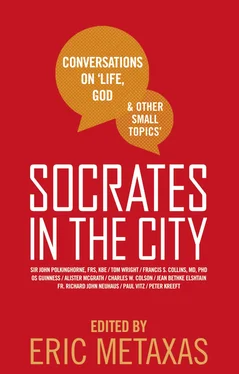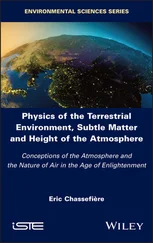So, why is science possible? Why can we understand the world so thoroughly and so profoundly? In fact, the mystery is greater than that even, because it turns out that mathematics is the key to unlocking the secrets of the physical universe. It’s an actual technique in fundamental physics to look for theories whose mathematical expression is in terms of beautiful equations. Some of you will know about mathematical beauty, possibly not all of you. It’s a rather austere form of aesthetic pleasure but something that those of us who speak the language of mathematics can recognize and agree upon. This is the experience of three hundred years of doing theoretical physics in which the theories that fundamentally describe the world always turn out to be framed in terms of beautiful equations. It’s an actual technique of discovery to look for equations of that sort.
The greatest theoretical physicist I’ve known personally was Paul Dirac, one of the founding figures of quantum theory and a professor in Cambridge for many years. He was not a religious man, nor a man of many words. He once said, “It is more important to have beauty in your equations than to have a fit experiment.”
Of course, by that, he didn’t mean it didn’t matter, or [that] empirical adequacy is a dispensable thing in science. No scientist could possibly mean that, but if you had a theory and it didn’t look as though, at first sight, your equations were going to fit the experiment, there were just possibly some ways out of it. Almost certainly you would have had to solve the equations in some sort of approximation. Maybe you made the wrong approximation or you hadn’t gotten the right solution or maybe the experiments were wrong. We’ve learned that more than once, I have to say, in the history of science. But if your equations were ugly, there was no hope for you. They could not possibly be right.
Dirac was, undoubtedly, the greatest British theoretical physicist of the twentieth century. He made those discoveries due to a relentless and highly successful lifelong pursuit of beautiful equations.
Now, something funny is happening there. We’re using mathematics, which, after all, is a very abstract form of human activity, to find out about the structure of the world around us. In other words, there seems to be some deep-seated connection between the reason within— the mathematical thoughts in our minds, in this case— and the reason without, which is the path and order of the physical world.
Dirac’s brother-in-law, Dr. Eugene Wigner, who also won a Nobel Prize in physics, once asked, “Why is mathematics so unreasonably effective?”
Why does the “reason within” apparently perfectly match the “reason without,” that is, the wonderful order of the world in which we live? That’s a deep question, a meta-question, and those sorts of questions do not have simple knocked-out answers. They are too, too profound for that, but for me, a highly intellectually satisfying answer is the following: The reason within and the reason without fit together because, in fact, they have a common origin in the rational mind of the Creator, whose will is the ground both of our mental experience and the physical world of which we are a part.
You could summarize what I have been trying to say so far by saying that as physicists study the world, they study a world of wonderful order, a world shot through, as you might say, with signs of mind. If that’s so, then it seems to me it’s, at least, a hypothesis worth considering, because, in fact, the capital- M Mind of the Creator lies behind that wonderful order. I, in fact, believe that science is possible, that the world is deeply intelligible, precisely because it is a creation. To use ancient and powerful language, we human beings are creatures made in the image of our Creator. The power to do theoretical physics is a small part— a small part, no doubt— of the imago Dei [image of God].
So, that is one sort of meta-question, and it illustrates the way our religious belief and understanding does not tell science what to think in its own domain. We have every reason to believe that scientifically presentable questions will receive scientifically articulated answers, even though some of those answers may prove very difficult to find. But the meta-questions take us beyond science, and it seems to me that religion can provide intellectually satisfying and coherent responses, enabling science to be set within a wider and more profound setting of intellectual intelligibility.
I would like to ask a second meta-question: Why is the universe so special? Scientists do not like things to be special. Our instinct is to like things to be general, and our natural assumption would be that the universe is just a common-variety garden specimen of what our universe might be like— nothing very special about it. But as we’ve studied and understood the history of the universe, we’ve come to realize we live in a very remarkable universe, indeed, and if it was not as remarkable as, in fact, it is, we would not be here to be struck at the wonder of it.
The universe started extremely simply; 13.7 billion years ago is the rather accurate figure that cosmologists say. It started as almost a uniform expanding ball of energy, which is about the simplest possible physical system you could ever think about. One of the reasons why cosmologists talk with a certain justified boldness about the fairly early universe is because it is a fairly easy thing to think about. But our world is not so simple; it has become rich and complex, and after almost fourteen billion years, it has become the home of saints and mathematicians. We’ve come to realize, as we understood the steps by which that has happened, that though it took a long time— as far as we know, ten billion years for any form of life to appear and fourteen billion years for self-conscious life of our complexity to appear— nevertheless, the universe, in a very real sense, was pregnant with life from the very beginning. It is, in this sense, that the physical fabric of the world— that is, the given laws of nature that science uses as the basis of its exploration of what is going on, but whose origin science itself is unable to explain, which are the unexplained given, in terms of which science frames all its subsequent explanations— had to take a very precise, very finely tuned form, if the evolution of any form of carbon-based life, like ourselves, was to be a possibility in cosmic history.
Of course, the evolution of life, the evolution of the universe, was an ongoing process, but evolution by itself has to have the right material to act upon. Unless the physical fabric of the world was finely tuned for the possibility of carbon-based life, the universe could have evolved away forever, and nothing interesting would have happened. This history would have been boring and sterile in the extreme. So, we live in a very special world.
Let me just give you a couple of illustrations of why we think that is so. There are many, many arguments that point in that direction. I could spend all evening trying to list them, but I won’t do that. I’ll just give you a couple of examples. The first example is this: The very early universe is very simple, and so, it does only very simple things. For the first three minutes of the universe’s life, the whole universe is immensely hot, immensely energetic. It is a sort of cosmic hydrogen bomb with nuclear reactions going on all the time.
As the universe expanded, it cooled. After just about three minutes, the universe was so sufficiently cooled that nuclear reactions on a universe-wide scale, on a cosmic scale, ceased, and the gross nuclear structure of the world was frozen out as, in fact, what we see it to be today, which is three-quarters hydrogen and a quarter helium. The early universe was very simple and made only very simple things. It made only the two simplest chemical elements, hydrogen and helium, and those two elements have a very boring chemistry. There is nothing very much that you can do with them.
Читать дальше











